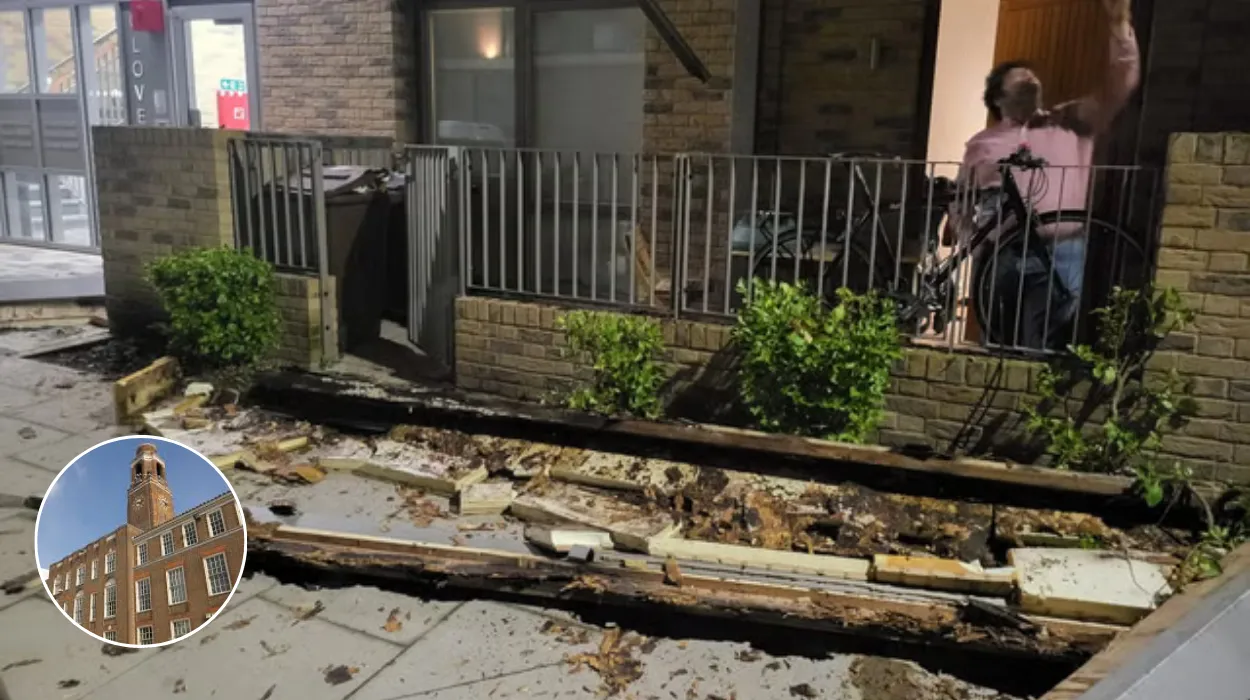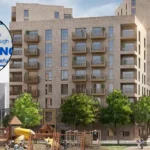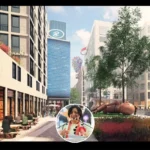Key Points
- A BBC investigation has revealed that balconies on the £41m Weavers Quarter estate in Barking, east London, were so poorly designed they posed a “risk to life” from the outset.
- One balcony collapsed in November 2023, prompting emergency scaffolding on 77 others and a ban on residents using their balconies.
- Scientific analysis found the collapsed balcony used plywood intended for indoor use, with weak glue and non-durable wood species, making it highly susceptible to decay.
- Experts say even if built to the original specifications, the balconies would still have been fundamentally unsafe.
- Residents have reported concerns for years, with some describing the collapse as a “miracle” that nobody was killed.
- Bouygues UK, the multinational construction firm responsible, has apologised but did not directly address new allegations about fundamental design flaws.
- Barking and Dagenham Council, the estate’s freeholder, says it acted urgently but lacks legal power to force repairs, as responsibility lies with the housing association L&Q and Bouygues.
- The Health and Safety Executive has launched an investigation, and the estate has lost a major housing award as a result of the scandal.
- Residents and campaigners are calling for urgent government intervention and a review of council contracts with construction firms.
What Did the BBC Investigation Reveal About the Weavers Quarter Balconies?
An in-depth investigation by Guy Lynn and Stephen Menon of BBC Investigations has found that the balconies on the Weavers Quarter estate, constructed by Bouygues UK, were so poorly designed they “posed a risk to life” from the very beginning. The estate, part of a major regeneration project for affordable housing on the former Gascoigne estate, saw one of its balconies collapse in November 2023, triggering widespread safety fears and urgent remedial action.
- Key Points
- What Did the BBC Investigation Reveal About the Weavers Quarter Balconies?
- How Did the Balcony Collapse Happen and What Was the Immediate Impact?
- What Did Scientific Analysis Reveal About the Balcony Materials?
- Were There Prior Warnings or Other Incidents?
- Who Is Responsible for the Construction and Oversight?
- What Has Been the Response from Local Authorities and the Mayor?
- What Are Residents and Campaigners Demanding?
- What Are the Wider Implications for Building Safety in the UK?
- What Happens Next for Weavers Quarter Residents?
According to the BBC, experts who reviewed the original architectural plans concluded that the balconies were fundamentally flawed, regardless of whether they were built precisely to specification. The design itself was inherently unsafe, meaning the risk was present from the outset of the development.
How Did the Balcony Collapse Happen and What Was the Immediate Impact?
On a Saturday evening in November 2023, a balcony at the Weavers Quarter estate suddenly collapsed, sending heavy beams of steel and wood crashing onto the flat below. As reported by the BBC and the Evening Standard, shocked residents described the incident as a “miracle nobody was seriously injured”. Photos shared on social media showed large pieces of timber and debris scattered across the pavement.
Kinga Surowka, who lived directly beneath the collapsed balcony, recounted to BBC Investigations: “There were enormous beams of steel and wood that fell onto my apartment. The balcony came crashing down – we could have lost our lives here with our children”. This harrowing experience led to immediate safety measures, with scaffolding erected around 77 balconies and residents banned from using them or walking beneath.
What Did Scientific Analysis Reveal About the Balcony Materials?
The BBC obtained samples from the collapsed balcony and commissioned tests at Bangor University’s BioComposites Centre, a leading UK laboratory for biological materials. The analysis, led by Dr Morwenna Spear, found that the plywood used was a non-durable species of poplar, bonded with a weak glue – both wholly unsuitable for outdoor use.
Dr Spear told BBC Investigations: “In terms of the wood itself, it’s not a durable one, it shouldn’t be outdoors. In terms of the glue, it’s very weak when it gets wet, so it also shouldn’t be outdoors. That product should be used indoors only, that’s a big fail on somebody’s part”.
Were There Prior Warnings or Other Incidents?
Residents had been raising concerns about the balconies for years. Matt Lismore, chair of the Weavers Quarter Residents Association, told the Evening Standard and Inside Housing that he had repeatedly reported safety issues to Barking and Dagenham Council, including a smaller partial collapse in 2021. Lismore stated: “It’s a miracle that nobody was seriously injured… I have repeatedly asked our local councillors and the leader of the council, Darren Rodwell, following the first collapse to remedy these issues and he has taken no action”.
Lismore also revealed that property managers told him in August 2023 that “there were no issues with the balconies and that I was categorically wrong to assert there was”. The BBC further reported that residents had been prevented from using their balconies since the November collapse, with many homes still surrounded by scaffolding months later.
Who Is Responsible for the Construction and Oversight?
Bouygues UK, a major multinational construction firm, built the Weavers Quarter estate for £41.5 million. The estate is owned by Barking and Dagenham Council through its housing company, B&D Reside, but the development was managed by the L&Q housing association (initially East Thames), which contracted Bouygues.
A spokesperson for Bouygues UK told the BBC: “Safety in our buildings is our number one priority. The design and materials were carefully considered by our professional consultants and the approving authorities. The balconies were prefabricated offsite by a subcontractor, and the materials used may not be those that were specified in the design. We take this extremely seriously”.
However, Bouygues UK did not directly address the new allegations that the design itself was fundamentally flawed, instead referring back to previous statements of regret and noting that repairs had been carried out.
What Has Been the Response from Local Authorities and the Mayor?
Barking and Dagenham Council said it “took immediate steps to impress upon Bouygues the need to ensure all balconies on the newly-rebuilt estate are safe” and welcomed the BBC’s investigation. However, the council stated it does not have the legal power to compel Bouygues to address defects, as responsibility lies with L&Q, the housing association that managed the development and contracted the builder.
A spokesperson for Mayor Sadiq Khan said: “It is vital that all building owners regularly take steps to review their properties for structural issues to ensure the safety of residents. The mayor’s team has met with residents of the estate and is in regular contact with Barking and Dagenham Council to monitor progress and ensure these issues are resolved rapidly”.
What Are Residents and Campaigners Demanding?
Residents remain deeply concerned for their safety and the quality of the construction. Matt Lismore, speaking to Inside Housing, said: “I am extremely concerned about the volume and severity of latent defects on new build housing in the borough, particularly stock for which the council is the freeholder. I look forward to reading the findings in due course”.
Campaigners are calling for urgent government intervention to give councils greater powers to force construction firms to repair defects and for a review of all council contracts with major builders.
What Are the Wider Implications for Building Safety in the UK?
The Weavers Quarter scandal is not the first time Bouygues UK has faced safety controversies. In 2014, the company was fined £175,000 after a worker was crushed to death at a hospital construction site. The BBC investigation has prompted the Health and Safety Executive to launch an inquiry, and the estate has lost a major housing award from WhatHouse? as a result.
The case has reignited debate about the safety of new build homes, the adequacy of oversight, and the need for stronger legal powers for councils to enforce repairs and accountability in the construction sector.
“You come to the realisation you could have been killed. You make all the right noises about the problem and still be put at risk. It fills you with horror.”
— Matt Lismore, Weavers Quarter Residents’ Association, as reported by BBC News.
What Happens Next for Weavers Quarter Residents?
Many residents remain unable to use their balconies, still surrounded by scaffolding, and are anxiously awaiting the outcome of the Health and Safety Executive’s investigation. The BBC’s findings have led to renewed calls for urgent repairs, compensation, and a fundamental review of how new housing developments are regulated and maintained.
Bouygues UK has apologised for the distress caused and said it is taking the matter “extremely seriously”, but questions remain over how such fundamental design and material failures were allowed to occur on a flagship regeneration project intended to provide safe, affordable homes.



